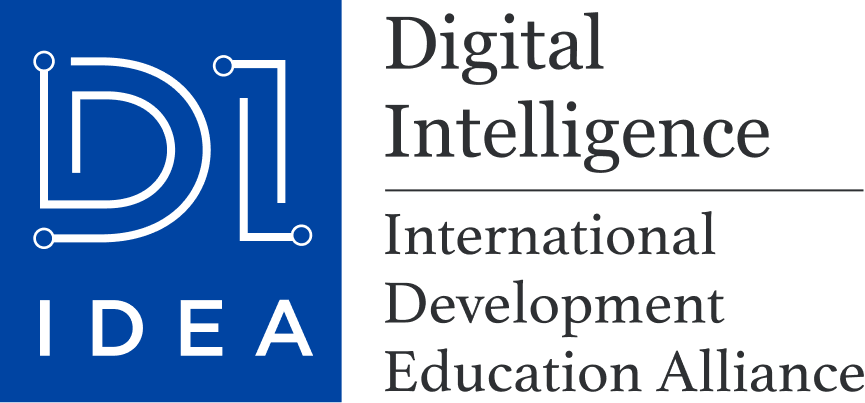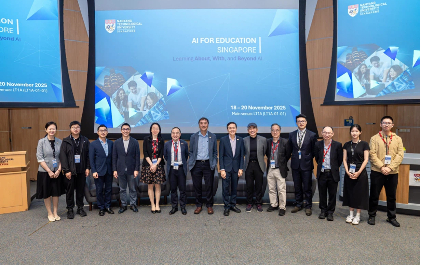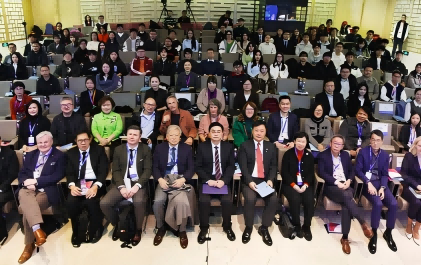The 2025 World Economic Forum Annual Meeting of the New Champions (Summer Davos) was held from June 24 to 26 at the National Convention and Exhibition Center (Tianjin). Chinese Premier Li Qiang attended the opening ceremony and delivered a keynote speech. With the theme of “Entrepreneurship for a New Era,” this year’s forum brought together over 1,700 leaders, entrepreneurs and scholars from business, government, civil society, international organizations, representing more than 90 countries and regions.
On June 24, Peking University and the Digital Intelligence International Development Education Alliance (DI-IDEA) co-hosted the sub-forum titled “Digital Intelligence: Insights from Academia, Industry and Beyond” in the Geneva Hall. Participants included Sun Hua, Director of the Office of the Provost and Director of the Center for Excellent Teaching and Learning at Peking University, and Secretary-General of DI-IDEA; Li Yun, Director of the Office of International Relations at Peking University and Deputy Secretary-General of DI-IDEA; Liu Baiqi, CEO of Galactic Energy; Li Dahai, CEO of ModelBest; and Qiao Xin, CEO of DeepWise. The forum was moderated by Zhang Ying, Associate Dean of the Guanghua School of Management at Peking University and Deputy Secretary-General of DI-IDEA.
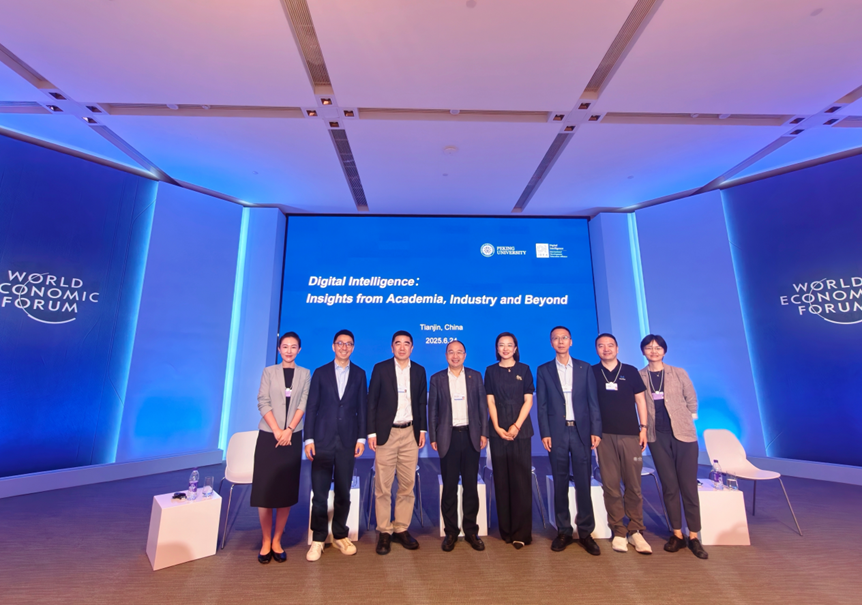
Group photo of participants
In his opening remarks, Sun Hua highlighted General Secretary Xi Jinping’s call to “promote the deep integration of AI-driven scientific and industrial innovation and build a collaborative innovation system driven by enterprises.” He stated that this guidance charts the course for advancing interdisciplinary research and technological innovation. As 2025 marks Peking University’s “Year of Scientific and Technological Innovation,” the university is refining its top-level design to establish a unique AI ecosystem. Sun emphasized the vital role of universities as sources of innovation and talent hubs, calling for enhanced university-industry collaboration to address key development bottlenecks. He urged attending enterprises to work together with PKU to integrate the education, talent, industry, and innovation chains, thereby contributing to future talent cultivation and social progress.
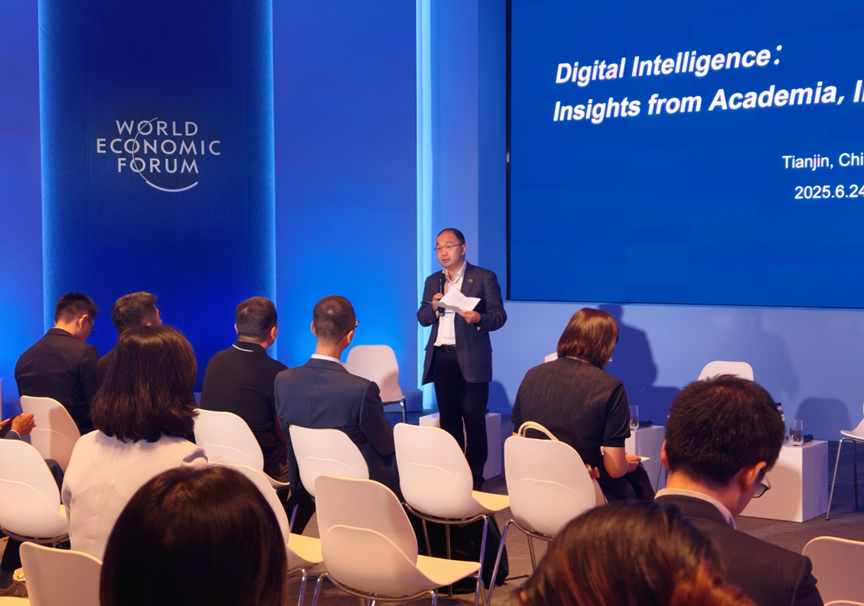
Sun Hua delivers remarks
During the roundtable discussion, Li Yun analyzed the multidimensional impact of technological transformation on higher education. She noted that emerging technologies such as digitization and AI have revolutionized research paradigms for faculty and learning methods for students, while also reshaping the framework of international cooperation in higher education. No longer limited to traditional exchanges, global collaboration now emphasizes co-construction, shared innovation, and joint responses to the challenges of the digital intelligence era. Li proposed maximizing the empowering potential of technology to foster mutual learning among students and faculty, establishing a global framework for coordinated development in higher education, and expanding international cooperation networks to pool global academic resources for the advancement of human civilization.
Liu Baiqi presented innovative approaches to cultivating technological talent in the new era. With the growing deployment of large-scale satellite networks driving the transformation of the aerospace industry, talent development must transcend traditional disciplinary boundaries to emphasize interdisciplinary and integrated skillsets. While Chinese students are reaching the international frontier in academic research and technological innovation, the key lies in translating concepts into tangible outcomes. Liu advocated for instilling both innovative thinking and implementation skills, encouraging students to consider practical feasibility and engineering constraints from the outset of a project. He also stressed the value of reverse thinking, urging innovators to anticipate and address technical, engineering, and societal challenges early in the process to accelerate industrial application and inject momentum into emerging sectors.
Li Dahai shared his perspective on talent development in the AI era. He argued that as AI becomes increasingly capable of handling specific tasks, future professionals must possess strong generalist abilities—identifying and defining key problems amid complexity and making sound evaluative decisions. However, he cautioned that generalist capabilities must be grounded in deep subject-matter expertise. A robust knowledge network helps extend cognitive boundaries, enabling individuals to apply generalist thinking to high-value problems. Such interdisciplinary professionals with strong domain knowledge and cross-sectoral insight will play a crucial role in the digital intelligence age.
Qiao Xin discussed the integration of AI and healthcare, outlining the industry's growing demand for interdisciplinary talent. He noted that scientific analysis and modeling of medical data, along with cross-disciplinary knowledge integration, are now critical. Although medical schools have strengthened engineering and information science training, the rapid advancement of AI calls for even higher-level skills, particularly in statistics and data analysis. Qiao highlighted improved university-enterprise collaboration, where internships help students gain practical experience and companies offer industry mentors to support talent development. Given the evolving nature of medicine, he advocated for a lifelong learning system that combines corporate training with higher education to flexibly empower professionals and advance healthcare digitalization.
Zhang Ying pointed out that current academia-industry collaboration largely focuses on the commercialization of university research, yet researchers often lack an industry perspective, neglecting real-world constraints. He emphasized the need for seamless alignment between higher education and “industrial education”—meaning education that supports lifelong professional development. In the context of rapidly evolving AI technologies and increasingly powerful AI tools, Zhang urged stakeholders to rethink how to help graduates adapt to the changing job market and how to reform collaborative innovation and talent development models in higher education.
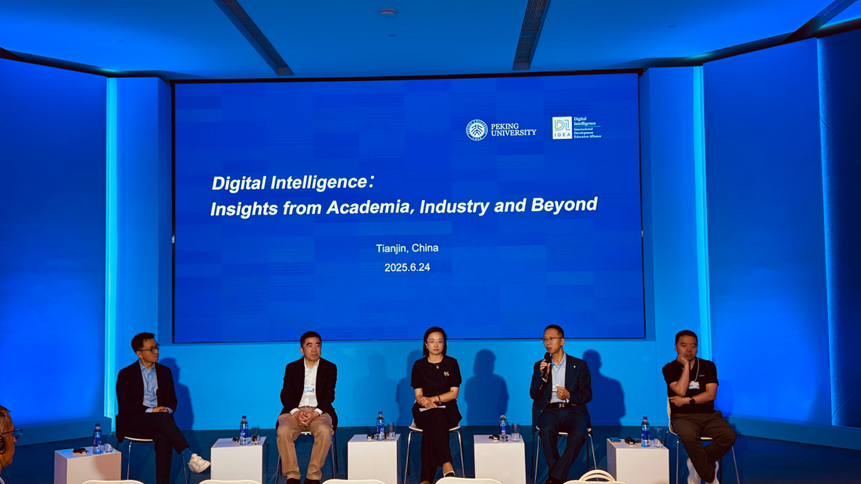
Roundtable discussion
As a major annual event co-hosted by Peking University and DI-IDEA, the forum explored frontier trends in the digital intelligence industry and new pathways for talent cultivation. By examining core issues in industrial practice and future-oriented education from both entrepreneurial and academic perspectives, it analyzed the evolution of technological paradigms, emphasized innovation in application scenarios, and addressed sustainable development goals. The forum provided valuable insights into the coordinated advancement of scenario application, technological innovation, and talent supply, highlighting the joint responsibility of academia and industry in promoting sustainable development.
